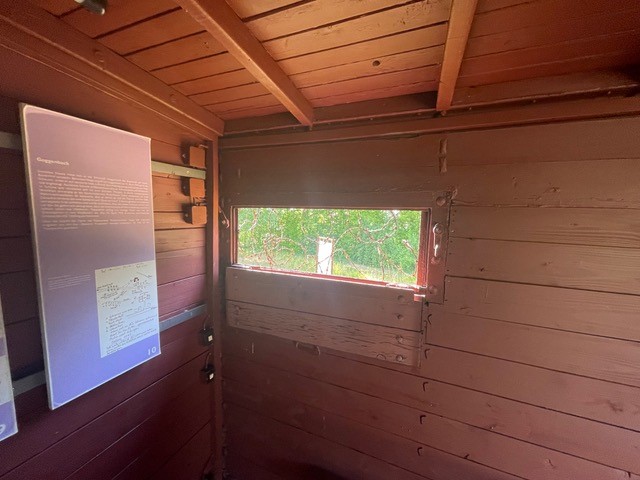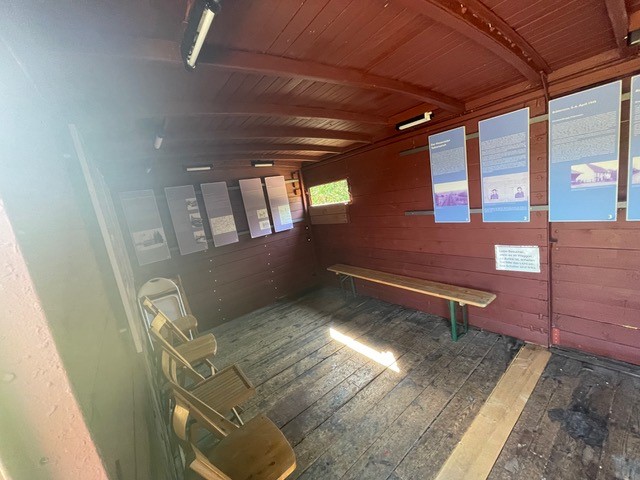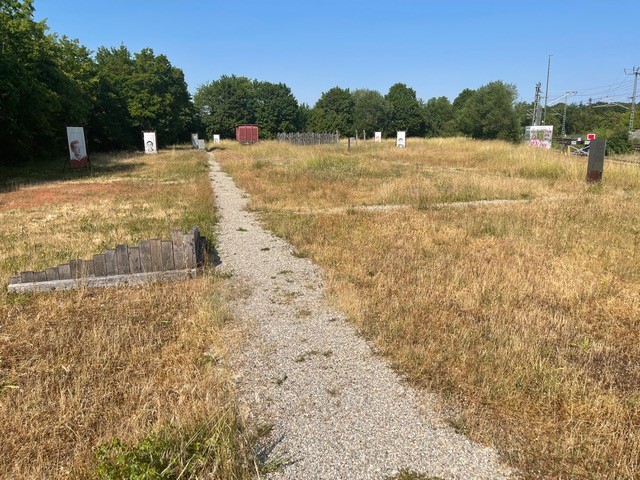Ansbach on Father’s Day and other events of the day
My paternal grandfather was stationed in Germany as an Army mechanic during the Vietnam War. I never knew where, specifically, in Germany he was. I just remembered the stories he would tell to me as a child of his time there. And as I got older, more and more what he hated about it. When I realized I would have the chance to be in Germany over the summer, and be able to travel very freely, I knew I wanted to go wherever it was he was stationed. I thought I would need to ask my grandmother, but my own father actually knew: Ansbach, Germany, in the state of Bavaria, not far from Nuremberg. It is a small town, with not much to do; I didn’t care about fun or Pomp when going. I wanted to go to see a town my late grandfather had once lived in, at a pivotal point in his life.
I had planned on going to Ansbach before I left for Germany. It was one of the reasons I was looking forward to doing this Summer Abroad. I thought it could be a way to feel more connected to my grandfather. It isn’t quite a clear-cut thing. My grandfather always urged me to not join the military, as he had. He knew that my sister and I could go to college and do well. He did always tell me stories of his time there though, his times spent playing war games in Germany. How competing in those games made him realize how quickly people die in war, without a chance to do anything else. My grandfather passed away when I was in my junior year of high school, so he never saw me off to college, never learned where I would go. But I do know that he would be excited for me to have been given the opportunity to study abroad in Germany. My father’s family (on both sides) all came from some part of Germany, so it has been interesting to be in a place where family once was, and even more interesting to be in a town my grandfather would once have walked.
On the train ride there (it was more like 5 different trains), I thought about my grandfather. About how I will go back to the U.S. soon, and share with my family over the rest of the summer my experiences here. However, I can’t share them with my grandfather. I realized on the train, and once off and walking the streets of Ansbach how much I wish I could share my experiences in Germany with him.
He didn’t, to my knowledge, see other parts of Germany while he was here, let alone Berlin. He was a stern man, but when I knew him he always gave off an air of peacefulness, or wisdom which I was always drawn to as a child.
Sometime on the way back to Heidelberg, I realized that it was Father’s Day in America. That had not been planned. It feels fitting now, that I had gone on a trip in the footsteps of my grandfather on Father’s Day. I have included some photos of the town, and of the palace gardens which are near the main train station. I don’t even know if my grandfather was allowed off of base (I imagine he would have been), and so I tried to find things that he would have liked. He would most definitely have enjoyed the palace gardens. It would have been a place he could sit and read, or just relax. They would also have been there when he was there.
The town wasn’t special in any obvious way; Ansbach has a personal connection to me, a loose one I’ll admit, but it was still enough to make it interesting. It also let me think about my grandfather actively, which isn’t something I’ve really done since he passed away.
On the way back to Heidelberg, I had terrible issues with trains (as one does in Germany, apparently). I ended up at a station that had acted as a transitionary station on the trip to Ansbach. When I was there the first time I saw a sign advertising a memorial to the victims of a death march and concentration camp from the second world war, I didn’t have time to go look at it the first time. But, the second time, I had 40 minutes before my train arrived, so I decided to go look at the memorial. I misunderstood the sign, as it was not just a memorial, but the actual remains of the concentration camp, with the names of all the victims on poles in the ground.
A train car, like the one they were forced onto, in the middle of the area. It immediately felt heavy. This was just here, next to the train stop. The signage said that there were around 800 in this spot. The entire section of this camp, which was connected to a larger network in the area, was shockingly small. I was shocked that that was just there, between a rail line and the road. It wasn’t concealed either, it was visible from the street. And to think of all that happened there. I read the plaques that were all around, the banners with the names of victims. One was a boy, aged 15 years old when he entered the camp, another was 17, another 20. The oldest person that I saw was 35. I didn’t read all the names, there were hundreds of names carved into the little bronze plaques, put on tall wooden poles, but I saw around ten, they were all but one, below the age of 21. They were my age and younger. I read the signs that laid out the history. And it seems like this camp was known for the depravity of the SS guards.
It made an already introspective day, much more introspective. I thought of people I’ve known that would have been victims in the Holocaust. One of my classmates in my program is Jewish, and in high school I knew someone who had Sinti and Roma ancestry. My peer in the study program is older than some of the named victims of this camp, and my peer from high school would have been around the same age as the younger people there.
Both of these events, crammed into one short day, are events that I never would have experienced without being able to study abroad. Connecting with family history, and later in the day walking in the Hollywood remains of a palace once filled with hatred and evil. The latter is an experience that I don’t think I will forget. I was expecting a plaque explaining the history and that it was important to remember, but instead, found the actual location of that history, before which I had only ever read about. While I’ve been in Germany, I have seen reconstructed Synagogues, ruins of synagogues, and a museum dedicated to the Sinti and Roma experience in the Holocaust, but I never expected that I would see a concentration camp. Nor did I think that if I had seen one, it would be on the side of the road next to the train station like a McDonald’s would be.




